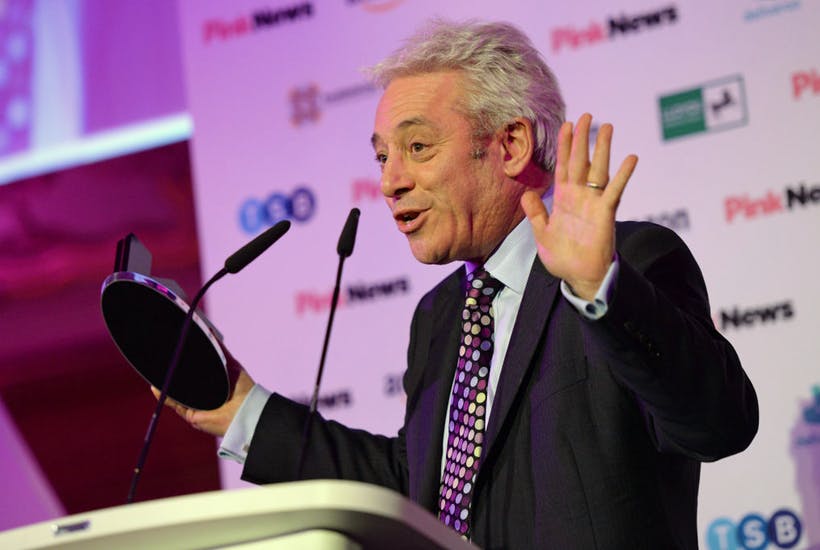What’s John Bercow up to these days? The ex-Speaker is enjoying the limelight, of course, but he isn’t necessarily cashing in. Last Friday, he did a solo gig at a community centre in Holland Park where his appearance raised thousands of pounds for a local charity. He charged no fee. And he spent time before and after his speech chatting happily to anyone who approached him. But then Bercow has always liked to talk. His parents, who noticed their son’s verbosity, said:
‘John, generally speaking, is generally speaking.’
He made this joke against himself during his hour-long speech. It wasn’t his only essay in self-mockery:
‘We may be short,’ he said, on behalf of smaller people everywhere, ‘but we’re environmentally friendly. We take up less space.’
He denied that he was the shortest Speaker in Commons history and he named three of his predecessors, from medieval times, whose stature was less than his own, ‘although that was after they’d been beheaded.’
He was very keen to revisit the battles of his ten-year Speakership. His reflections were sometimes witty, sometimes merely vituperative.
He couldn’t bring himself to name the parliamentary sketch-writer, Quentin Letts, who christened him ‘Mr Squeaker.’ Instead he referred to, ‘a downmarket, fifth-rate scribbler on the “Daily Fail”…which breaches the trades descriptions act by calling itself a newspaper’.
Of his predecessor, Betty Boothroyd, he said, ‘She frequently offered me advice – sometimes even when I’d asked for it.’
His experiences with the Tory whips still nettle him. ‘Our relationship was based on understanding and trust. I didn’t trust them and they didn’t understand me.’
He singled out two in particular. Andrew Lansley, he said, was, ‘not noted for a surplus of imaginative qualities.’
And Julian Smith once got into a heated dispute with him that prompted Smith to thump the table in the Speaker’s office.
Bercow:
‘I told him. First, that’s a discourtesy to the Chair. Second, it’s a discourtesy to the wood. And if he thought I’d be intimidated by that he’d need his head examined.’
He told us that he once occupied the chair for 14 uninterrupted hours during a marathon session of parliament. ‘I was sustained only by mints and cashews procured by a benevolent whip – although that’s a contradiction in terms.’

He’s immensely proud of the reforms he brought to Westminster which, he claimed, were bitterly opposed by Tory grandees. When he became Speaker, there was a shooting-range in parliament but no creche. He reversed that position. Senior Tories advised him not to invite London school-kids to the Commons because, ‘pen-knives will do damage to the green leather benches.’
He paused and pulled an outraged face.
‘What kind of gammon reactionary would suggest that?’
He answered without embarrassment when asked about his youthful membership of the far-right Monday Club:
‘I fell under the sway of my father, an admirer of Enoch Powell, who held racist views and had an aversion to Pakistani and Asian migrants.’
He said that youths like him – ‘I was rather a confused young man’ – are apt to be taken in by a system that ‘has an answer to everything. It’s all in this book.’
That hardly sounds like any body of work written by Enoch Powell. He reminded us that he left the Monday Club in 1984, when he was 21, finding its anti-Semitism ‘unpalatable.’
On the subject of Brexit, he said that Remain’s best opportunity came and went last October. ‘A short-term coalition government to administer and deliver a People’s Vote might have been formed,’ he said.
He had no doubt who sabotaged this possibility:
‘Jo Swinson wasn’t prepared to allow Jeremy Corbyn to be temporary prime minister. But the fear that this would lead to years and years of Corbyn and John McDonnell is for the birds.’
He also blamed Boris’s landslide on the former Lib Dem leader. ‘Jo Swinson saw some evidence that she might win 60, 80 or 100 seats, and [there would be] every chance of a coalition government.’
This turned out to be a ‘mirage’ because, as Bercow put it simply, ‘Boris held his nerve.’
But the Brexit battle has drawn Bercow into strange lapses of logic. ‘Contradictory’ would be a generous way to describe his double-think. He likes to claim that he supervised parliament with complete impartiality and yet he keeps advertising his view that Brexit will be disastrous. The two are not compatible.
Given his influence in the Commons and his boundless self-approval, he was always likely to be a leading – if not the leading – player in the plot to thwart Brexit. During the three-year power-struggle, most Leavers considered him their deadliest foe. And yet, last Friday, he insisted he had acted even-handedly.
‘I didn’t force the issue one way or another.’
Does he seriously believe that? Moments after making that puzzling statement, he won a loud ovation by declaring, ‘Brexit will hurt most those who have least. But the UK might re-join!’
Why does he continue to claim he was always neutral? No one is fooled.







Comments